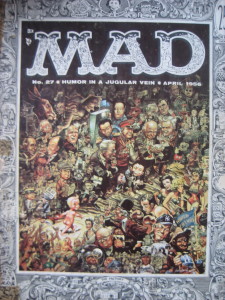I learned about satire and parody from MAD magazine; I learned fear and pain from my father. The two sometimes went hand in hand.
At age ten, I started reading MAD magazine, a comic book my friend Rich discovered. We thought it was neat because it had characters like Superdooperman, the Lone Stranger and Little Annie Fannie…ooops, wait a minute, Annie was in Playboy. Sorry.
The government got involved with the content of MAD, as well as other comics like Vault of Horror and Tales from the Crypt, as not being appropriate for small fertile minds. They instituted the Comics Code Authority which regulated and approved comic content for kids with impressionable minds. Thus, MAD went from a comic book format to magazine in 1956, escaping the regulators, and we kids continued to purchase it along with Donald Duck and Superman, explaining the magazine was “for my older brother.”
MAD was a magazine of wit, satire, parody and “humor in a jugular vein.” Its creative contributors, Ernie Kovaks, Andy Griffith, Bob and Ray, Sid Caesar and a host of others, along with the regulars like Harvey Kurtzman, filled the pages with a world of cutting edge writing and drawing and played a key role in my wanting to be a writer, honing my developing sense of humor.
My father did not understand MAD. I dont think he ever took the time to really read it, just as he automatically condemned my taste in music (Perez Prado, the Weavers, Dave Brubeck). He never strayed from the regimented path he created for himself; if it wasn’t on Hit Parade ( a weekly top ten TV show), it wasn’t music worth listening to. That fell apart when the show, not by choice, by 1956, had to play the top ten which included Elvis Presley. He watched as the popularity of songs flipped between Patti Page and Mario Lanza to the Rock and Roll genre almost overnight. Within a short time, because of this change, the show went off the air.
The world was changing and my father could not adapt. Things he liked were becoming passe, things he believed in were being challenged and things he hoped for, like a son who would mature into his image of what a son should be, were being attacked. The world was changing and, unlike a reed in the wind, he could not bend. MAD exposed this world of change, poking fun at it, ridiculing it and explaining it in a humorous way. It became my magazine of choice, hidden from my father, throughout the late 1950’s.
If my father caught me reading a MAD magazine after banning it from the house, he would rip it to shreds and then punish me for my disobedience. This was even after a visiting priest to our house was confronted by my father asking for comment of the content within its pages. He fully expected the priest to agree with him as to the magazine being subversive.
The priest was there because I had made inquiry as to attending the seminary after graduation from grade school. The middle aged priest surprised my father and mother (and me too!) when he responded by explaining that even though the magazine touched on sensitive topics at times, it did so with restraint and intelligence and reflected a changing society and was not considered contraband in the seminary where it was read by some to gain insight into American culture. Dad was speechless.
My parents were hoping I would become a priest, and that day in 1959 dashed their concepts of a Bing Crosby, Father O’Malley type character and instead gave them a vision of Father Groucho, the unorthodox vestment wearing smart-mouth, holding a crucifix in one hand and a seltzer bottle in the other.
I was growing up, becoming my own person, and my father didn’t understand. The changing world, for me, did not alter fundamental family values I had been taught, but questioned society and government roles in managing and defining them. My world was expanding. Dad’s world was no longer flat. The Times they were a-changing.
